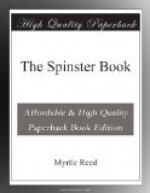[Sidenote: The Advertisement]
Death is the advertisement, at the end of an autobiography, wherein people discover its virtues. The public which refused a bare subsistence to the living genius will make his children comfortable by generously purchasing his letters, which were never meant for them.
The pathetic story of the inner struggle, which would have crucified the sensitive soul were it known to any save his dearest friends, is proudly blazoned forth—in print! Hopes and fears and trials are no longer concealed. Illness, poverty, and despair are given rubricated pages. The sorrowful letter to a friend, asking for five or ten dollars, is reproduced in facsimile.
[Sidenote: The Soldier of the World]
That it shows the human side of the genius is no excuse for the desecration. What of the sunny soul who always sang courage, while he himself was suffering from hope deferred! What of him who wrote in an attic, often hungry for his daily bread, and took care to give the impression of warmth and comfort! Why should his stern necessity be disclosed to the public that would not give him bread in return for his songs? It is enough to make the gallant soldier of the world turn uneasily in his grave.
In this way a bit of the greatness so bravely won is often lost, and sometimes illusions are dispelled which all must regret. For years, we have read with delight Mrs. Browning’s exquisite poem beginning:
“I have a name, a little
name
Uncadenced for
the ear.”
Throughout the poem there is no disclosure, but, so sure is her art, that there is no sense of loss or wonder. But the pitiless searchlight of the century is turned upon the Browning love letters, and thus we learn that Mrs. Browning’s pet name was Ba!
Pretty enough, perhaps, when spoken by a lover and a poet, or in shaded nooks, to the music of Italian streams, but quite unsuited to the present, even though it were to be read only by lovers equally fond.
“Though I write books,
it will be read
Upon the page
of none—”
Poor Mrs. Browning! Little did she know!
[Sidenote: With the Future in View]
There have been some, no doubt, who have written with the future in view, though Abelard, who broke a woman’s heart, could not have foreseen that his only claims to distinction would rest upon his letters to loving, faithful Heloise. The life which was to be too great for her to share is remembered now only because of her. Mocking Fate has brought the wronged woman an exquisite revenge.
That delightful spendthrift and scapegrace, Richard Steele, has left a large number of whimsical letters, addressed to the lady he married. She might possibly object to their publication, but not Steele! Indeed, she was a foolish woman to keep this letter:
“Dear Prue:
“The afternoon coach will bring you ten pounds. Your letter shows that you are passionately in love with me. But we must take our portion of life without repining and I consider that good nature, added to the beautiful form God has given you, would make our happiness too great for human life. Your most obliged husband and most humble servant,




